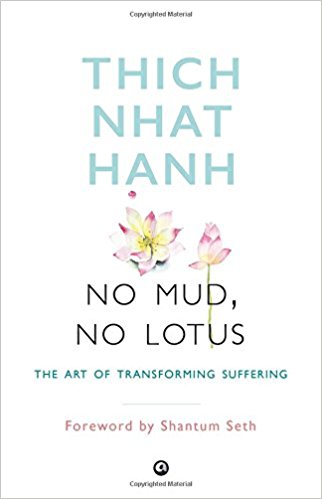 Author: Thich Nhat Hanh
Author: Thich Nhat Hanh
Publisher: Aleph Book Company
Year: 2017
ISBN: 9789384067489
Rating: 




Buy book at the lowest price
Well known Zen monk and spiritual leader Thich Nhat Hanh shares his knowledge and Buddhist teachings with modern world civilization by giving real life examples that everyone can relate to. The book's cover design and texture of its paper give a feeling of calmness in itself.
It’s a classic Thich Nhat Hanh writing. In a highly lucid manner he explains how to get peace of mind by art of mindfulness.
The book 'No Mud, No Lotus' is divided into two parts. The first part deals with the chapters that explain the nature of suffering, and how to overcome suffering by making mind and body one by developing compassion and communication.
As the metaphorical title suggests, the book tries to convey the symbiotic relationship between suffering and happiness. Without suffering, you can’t feel happiness just like without mud, lotuses can’t bloom. The book teaches how you can transform your suffering into happiness and bring a positive impact from it, that is by facing suffering and accepting it.
It is about taking it slow, being in the present moment, looking deep into the suffering, understanding it and embracing it. Every chapter has anecdotes that make the reader connect with them and actually understand how to inculcate the writings. The author lucidly helps you realize the origin of suffering while evaluating human reactions to sufferings and describing how that can be changed to get inner peace.
The second part of the book consists of essential practices for attaining happiness. It consists of life mantras, breathing exercises, meditations and relaxation techniques that help you achieve mindfulness. The book is a reminder that joy can be experienced by following little fundamental practices and a change of attitude.
Over all the book is an easy read , but becomes quite repetitive considering some areas. The author might have tried to make it repetitive so that the readers never forget it but at some point it gets a little over the top. Otherwise, it’s a perfect book to pick up and read whenever you feel that you are stuck with some kind of suffering or pain.
Latest posts by Tithi Wakhariya (see all)
- Book Review: Smart Guide for Awesome Memory by Shireen Stephen - August 9, 2018
- Book Review: No Mud, No Lotus-The Art of Transforming Suffering by Thich Nhat Hanh - November 15, 2017
No Comments